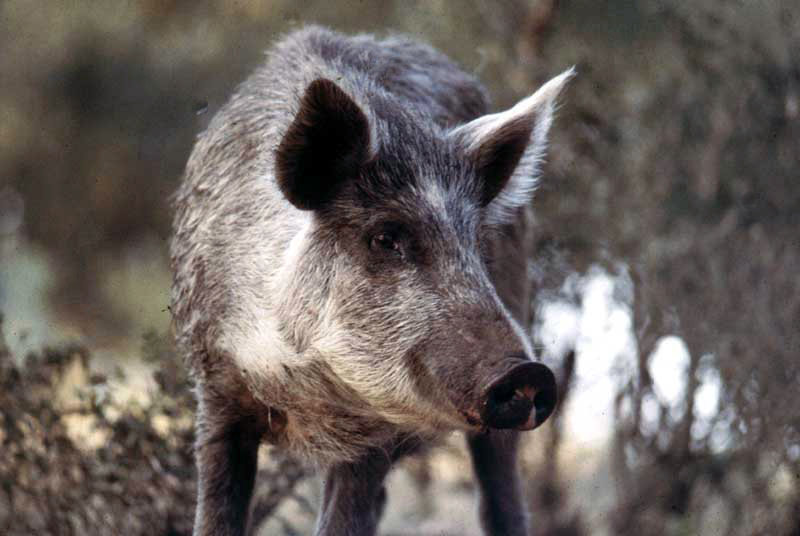Are There Feral Hogs in Pennsylvania?

Some recent reports have claimed feral hog populations are expanding throughout Pennsylvania, but
the
data doesn’t back up these claims. While they’ve been spotted in several counties over the past few decades, the United States Department of Agriculture (USDA) has found
current distribution is likely limited to just two counties.
Although feral swine sightings in the state are rare, the Pennsylvania Game Commission is proactively working to control and eliminate this invasive species.
Dr. Andrew Di Salvo, the Game Commission’s wildlife veterinarian, weighs in everything you need to know about feral hogs.
What are feral swine and where do they come from?
AD: Any swine or pigs that have escaped or been released from captivity and live in a wild state are considered feral swine. While swine naturally live in the wild in parts of Europe, Asia, and Africa, they are a non-native invasive species in the United States. They were first introduced to North America in the early 1500s by explorers and settlers as a food source. Since then, wild swine (Sus scrofa), which are also known as wild pigs, wild hogs, Eurasian boars, or Russian boars, have been imported and propagated for sport hunting. Any wild or domestic swine (Sus scrofa domesticus) that escape or are released from captivity can contribute to the feral swine population. Pigs can give birth twice a year with litter sizes that exceed a dozen piglets, so feral swine populations left unchecked can quickly grow out of control.
What impacts do feral swine have on the environment and on wildlife health?
AD: Feral swine are a dangerous, destructive, and invasive species. The feral swine population in Texas, which exceeds 3 million, causes more than $500 million in damage to agriculture and private property in that state each year. Feral swine can also harbor diseases that can impact the pork industry, as well as the health of other domestic animals, wild animals, and humans.
Where are feral swine in the United States and in Pennsylvania?
AD: Since the 1980s, feral swine have been reported across 35 states. Their current population in the United States is estimated at 6 million and growing.
In Pennsylvania, sightings of feral swine have occurred over the past decade but remain rare; any breeding populations are small and likely limited to Bedford and Fulton counties.
How do we manage feral swine in Pennsylvania?
AD: The Game Commission has jurisdiction over feral swine and over the past decade has worked closely with the USDA to eliminate feral swine reported within the commonwealth. In addition to targeted baiting, trapping, and culling of feral swine by the USDA, the Game Commission removed protection of feral swine populations statewide except in counties where official eradication operations are occurring. The removal of protection allows for additional take opportunities by authorized persons. As of December 2023, protection of feral swine has been removed across all counties in Pennsylvania.
What can
Pennsylvanians do to help?
AD: Any observations of feral swine in the commonwealth should immediately be reported to the Game Commission at 1-833-PGC-WILD or 1-833-PGC-HUNT.
The unlimited take of feral swine is available to licensed hunters so long as they comply with any statutory or regulatory limitations. Licensed trappers are also eligible for unlimited trapping of feral swine, but such activities require an additional permit issued by the Game Commission. Feral swine can be killed by any person if they are observed actively destroying agricultural property, immediately following the destruction of agricultural property, or if the destruction of agricultural property is imminent. Feral swine can also be killed by any person in self-defense if they clearly pose an immediate threat to any human. Regardless of means, all take of feral swine must be reported to the Game Commission within 24 hours of the kill.
Andrew Di Salvo
Dr. Andrew Di Salvo is Pennsylvania’s state wildlife veterinarian and has worked for the Game Commission since 2019.